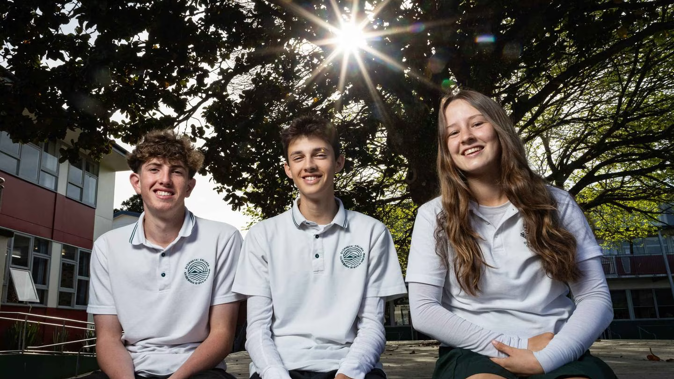
Cheese and crackers is the go-to study snack for one Tauranga student who is about to sit his NCEA exams on Monday.
Te Puke High School Year 12 student Charlie Anderson said “just a quiet space, and cheese and crackers” was good for him.
Charlie considered this snack “brain food” and kept him “real focused” while studying.
Charlie is one of about 145,000 students across the country who will be sitting the NCEA exams, which start this week and finish on November 30.
In the Bay of Plenty, 9500 students will be sitting their end-of-year exams. English was the most popular exam with 45,000 students sitting the test nationwide, NZQA says.
The Bay of Plenty Times spoke with Charlie and other local students ahead of their exams and a nutritionist shared the best “brain health” food for students.
Registered nutritionist Megan O’Mara said complex carbohydrates were “really important in terms of energy for the brain”.
O’Mara said foods such as “pasta, potatoes, wholegrain crackers, oats, wholegrain bread and rice” were best.
She suggested Charlie chose crackers that were “brown in colour” rather than “white or yellow based crackers” which tended to be higher in fat and “less nutritious”.
O’Mara said the perfect exam breakfast included wholegrain cereals, toast with eggs and “good dairy foods” such as yoghurt, cheese or milk.
She said foods high in Omega-6, such as nuts, seeds and avocado, were needed for good brain health.
“(They provide) longer-lasting release of energy, fueling the body, but also giving that satiety and preventing hunger cravings.”
She said it was important to stay away from energy drinks and caffeine at night as it could affect sleep cycles.
Good food and quality sleep were important for the “brain’s ability to sort, process and store that information” during exam season, O’Mara said.
/cloudfront-ap-southeast-2.images.arcpublishing.com/nzme/QAEGWCV3NFGJPMO7JQHKRTEP6U.jpeg)
Registered nutritionist Megan O'Mara said complex carbohydrates were “really important" for students.
Te Puke High School Year 12 student Tempest Cassin said the difference between NCEA English Level 1 and 2 was trying to find “loopholes” in exam questions and learning to “read between the lines” to answer an essay question.
Tempest said she was feeling “pretty prepared” for exams, and teachers had provided resources for the “extra push for me to do well”.
Te Puke High Year 12 student Jayde Moir’s exam preparation included creating a study plan and taking each exam “as they come”.
“Every time I have an exam... I have a brain food drink and probably a normal casual breakfast, not much different to a normal routine.”
She said it was important to have a balanced approach during exam season.
“Try not to put too much pressure on yourself.”
Te Puke High School Year 12 student Charlotte Winkworth said she was feeling “a bit nervous”.
“Make sure you’re in a steady routine and keep on top of it,” was her advice.
Charlotte enjoyed listening to music through her headphones in a room without distractions.
“I’m making sure I have a good steady sleep before my exam and a normal breakfast,” she said.
/cloudfront-ap-southeast-2.images.arcpublishing.com/nzme/DWAASOWDLRBONKJVHR6QMXEHEY.jpg)
Te Puke High School Year 12 students prepping for NCEA exams, which start tomorrow.
Te Puke High School acting assistant principal Kamal Nair said exams were “moving to a digital world”.
“Students and the way we prepare is changing and that is really, really exciting,” Nair said.
He said students and teachers had been “working really hard in [lunchtime] tutorials”, practising past exam papers and asking for help.
“The students are prepared and it’s up to them to go and deliver exam results.”
He said the school had received great exam results previously and was “expecting the same” in 2023.
/cloudfront-ap-southeast-2.images.arcpublishing.com/nzme/X4WB44A2KVH53JHCNSWTSCRSV4.jpg)
Ōtūmoetai future head students for 2024 (left) Tomás Andrew, Josh Brown, Kara Blackstock. Photo / Alex Cairns
Ōtūmoetai College Year 12 student Josh Brown said: “I’m dreading my Business [exam] because of all the material to learn.”
Josh was “feeling good” but was “ready to get them out of the way”.
He said finding a “quiet environment” where you can “put focus into your studies” was best.
Ōtūmoetai College Year 12 student Tomás Andrew was feeling “confident” and had “done a lot of preparation for them”.
His study tips included listening to music without lyrics to minimise distractions and enjoying a sweet treat such as “a bit of a [good] ol’ cookie”.
Ōtūmoetai College Year 12 student Kara Blackstock said she was taking five exams and had “created a routine” to learn the most beforehand.
NZQA deputy chief executive assessment Jann Marshall said students should “work out when, where and how you study most effectively”.
“Plan a schedule. Set study periods of 30 to 50 minutes, followed by a 15-minute break.”
Setting up an organised area to study, switching mobile phones to flight mode and building in time for relaxation and fun, fresh air and physical activity were other pointers from Marshall.
Top brain foods for studying
- Complex carbohydrates:
Pasta, potatoes, wholegrain crackers, oats, wholegrain bread and rice
- Omega-6:
Nuts, seeds and avocado
- Good dairy foods:
Yoghurt, cheese and milk
Top study tips
Create a routine
Listen to music without lyrics to minimise distractions
Plan a schedule - set study periods of 30 to 50 minutes followed by a 15-minute break
Set up an organised area to study
Switch mobile phones to flight mode
Build in time for relaxation and fun
Get fresh air and physical activity
Try not to put too much pressure on yourself
Michaela Pointon is an NZME reporter based in the Bay of Plenty and was formerly a feature writer.
Take your Radio, Podcasts and Music with you









